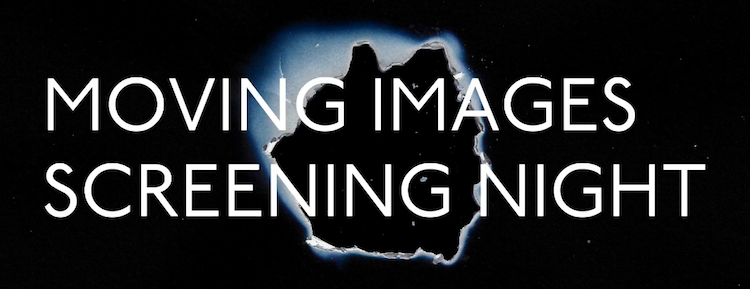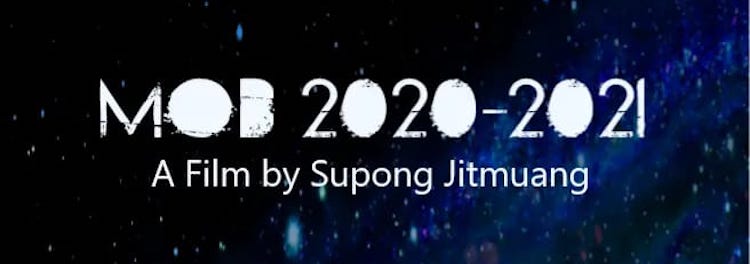

The third Moving Images Screening Night (คืนฉายภาพเคลื่อนไหว) took place at Doc Club and Pub in Bangkok on 30th June. (The first Moving Images Screening Night, on 28th April, featured Jittarin Wuthiphan’s powerful short film Still on My Mind, his record of a mob in Phuket attacking a man they accused of disrespecting King Rama IX. The second event, on 25th May, included Suwaporn Worrasit’s Ratchadamnoen Route View 2482+.) Each screening is divided into two themed programmes, which for the third event were Eclipse and Lucid Memory.
The highlight of the evening was Supong Jitmuang’s Mob 2020–2021, a chronicle of the current student protest movement. Supong told me that the film is “handmade”, emphasising the intricate nature of this two-hour documentary. Audience members received a Moving Images Screening Night brochure (Phase 01: Program Book), which the organisers also describe as “handmade”: a zine-style publication with a limited print run. Mob 2020–2021 postcards were also available.
Mob 2020–2021 covers the first twelve months of the anti-government protest movement. Supong and his camera were at Thammasat University on 19th September 2020, for the overnight rally that later occupied Sanam Luang. On 14th October 2020, he filmed the march to Government House, after which a state of emergency was declared. On 17th November 2020, he was on the front line when protesters used inflatable ducks to protect themselves from water cannon fired by riot police. (Sorayos Prapapan’s short film Yellow Duck Against Dictatorship documents the same event.)
The protests intensified last summer, and Mob 2020–2021 shows the rally at Democracy Monument on 18th July 2021 marking the first anniversary of the anti-government campaign. Last August, there were almost daily confrontations between riot police and protesters, but rather than filming each event, Supong summarises them in a general written caption noting the “multiple continuous clashes that lasted many weeks” (Hopefully, the ongoing Sound of ‘Din’ Daeng documentary series will cover this period, and the violent tactics employed by the riot police, in more detail.)
The closest equivalent to Mob 2020–2021 is probably Ing K.’s Bangkok Joyride (บางกอกจอยไรด์) though, of course, the two directors are from opposite ends of the political spectrum. Two renditions of Do You Hear the People Sing? in Mob 2020–2021, for example, serve as a counterpoint to Bangkok Joyride’s fetishisation of the national anthem. Bangkok Joyride and Mob 2020–2021 both provide an exhaustive record of street politics, though Mob 2020–2021 is a more objective account.
Mob 2020–2021 is the first feature-length documentary covering the recent protest movement. (The only other example, The Evil of Time’s Growth, focuses solely on the Thalufah group.) It’s an invaluable record of a profound social and political change in Thailand. Supong’s film also includes a written timeline of the protests, and its matter-of-fact neutrality is maintained throughout, except for a single reference to the “parasitic” government.
The highlight of the evening was Supong Jitmuang’s Mob 2020–2021, a chronicle of the current student protest movement. Supong told me that the film is “handmade”, emphasising the intricate nature of this two-hour documentary. Audience members received a Moving Images Screening Night brochure (Phase 01: Program Book), which the organisers also describe as “handmade”: a zine-style publication with a limited print run. Mob 2020–2021 postcards were also available.
Mob 2020–2021 covers the first twelve months of the anti-government protest movement. Supong and his camera were at Thammasat University on 19th September 2020, for the overnight rally that later occupied Sanam Luang. On 14th October 2020, he filmed the march to Government House, after which a state of emergency was declared. On 17th November 2020, he was on the front line when protesters used inflatable ducks to protect themselves from water cannon fired by riot police. (Sorayos Prapapan’s short film Yellow Duck Against Dictatorship documents the same event.)
The protests intensified last summer, and Mob 2020–2021 shows the rally at Democracy Monument on 18th July 2021 marking the first anniversary of the anti-government campaign. Last August, there were almost daily confrontations between riot police and protesters, but rather than filming each event, Supong summarises them in a general written caption noting the “multiple continuous clashes that lasted many weeks” (Hopefully, the ongoing Sound of ‘Din’ Daeng documentary series will cover this period, and the violent tactics employed by the riot police, in more detail.)
The closest equivalent to Mob 2020–2021 is probably Ing K.’s Bangkok Joyride (บางกอกจอยไรด์) though, of course, the two directors are from opposite ends of the political spectrum. Two renditions of Do You Hear the People Sing? in Mob 2020–2021, for example, serve as a counterpoint to Bangkok Joyride’s fetishisation of the national anthem. Bangkok Joyride and Mob 2020–2021 both provide an exhaustive record of street politics, though Mob 2020–2021 is a more objective account.
Mob 2020–2021 is the first feature-length documentary covering the recent protest movement. (The only other example, The Evil of Time’s Growth, focuses solely on the Thalufah group.) It’s an invaluable record of a profound social and political change in Thailand. Supong’s film also includes a written timeline of the protests, and its matter-of-fact neutrality is maintained throughout, except for a single reference to the “parasitic” government.
